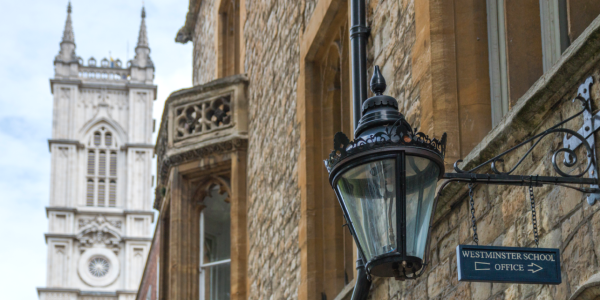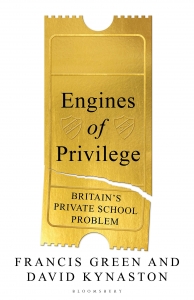Book Review | Engines of Privilege: Britain’s Private School Problem by Francis Green and David Kynaston
In Engines of Privilege: Britain’s Private School Problem, Francis Green and David Kynaston critically explore the issues surrounding private schooling in Britain and the possible avenues through which these can be solved through government policy. This is a highly valuable contribution to debates surrounding education and inequality in the UK, writes Ross Goldstone, providing evidence-based and thoughtful consideration of how the private school problem may be solved for the betterment of society.

Image Credit: Westminster School (Markus Trienke CC BY SA 2.0)
Engines of Privilege: Britain’s Private School Problem. Francis Green and David Kynaston. Bloomsbury. 2019.

In Engines of Privilege, Francis Green and David Kynaston critically explore the ‘problem’ of private schooling in Britain and the possible avenues through which this can be solved via government policy. Private schooling, in this book, is defined as fee-paying, independent schools in Britain which are colloquially coined ‘public schools’. This problem, and what makes British private schooling so ‘distinctive’ (3), is the social exclusivity characterising the sector and the way it enables the most privileged in society to purchase a high-quality education and be channelled onto ‘life’s gilded path’ (4).
The authors engage with this topic from a multidisciplinary background, with Green approaching it as a social scientist and Kynaston as a historian, providing a rigorous, academic and readable contribution to the debate on private schooling in contemporary Britain. Green, in particular, bestows credibility on this book given his career interest in private schooling and his numerous publications on this topic. Furthermore, the respectful ambience of the book, seeing the authors stray away from judgement of individual parents for choosing private education to instead locate the ‘problem’ within the system of private schooling, enables the book to remain welcoming to all and relevant to the national conversation they hope to trigger. However, its key contribution comes from its extensive use of evidence, rather than rhetoric, which provides valuable insight and sets it apart from other, recent contributions in this area.
The book is written in the context of growing social and economic inequality in British society, whereby there are growing calls for fundamental reform of its fabric, including its governing institutions. Green and Kynaston effectively show ‘the extent of the dominance of the privately educated in twenty-first century Britain’ using a range of statistical evidence (4). This dominance stretches across public, private, economic and cultural life, seeing all spheres of power and influence as overrepresented by privately educated individuals. Characterising this as ‘striking, in some cases grotesque’, they demonstrate how ‘bought educational privilege also buys lifetime privilege and influence’ (4). For example, despite the population of private schools constituting approximately seven percent of children in Britain, their alumni are shown to be grossly overrepresented in politics, business, the civil service, the legal profession, journalism, medicine and the military (5). Thus, given the unquestionable relationship between private schooling and positions of power and influence in British society, what Green and Kynaston are able to effectively portray is how any fundamental reform of British society must involve some level of reform of private schools.
In this review, I will focus on two interesting discussions within the book: firstly, the functions of high school fees in British private schooling; and secondly, how private schooling has at times benefited unintentionally from state policy, despite the latter being aimed at reducing the appeal of private schools for parents.
Following their portrayal of the dominance private school alumni enjoy in British society, the authors explore how this is achieved. This is through recognising, rather than denying, the high-quality service provided in private schools which amounts to ‘relatively small but still significant [and cumulative] effects at every stage of education’ (9). This is achievable via the greater funding per child the private sector enjoys, seeing £3 used for students in private schools compared to every £1 given to state school students (103–105). However, this service encompasses much more than just an education and has two additional features: providing positional resources and luxury. The first of these involves the use of economic capital to deliver positional advantage over non-private counterparts. The archetypal form this takes is, according to Green and Kynaston, employing staff who explicitly devote their time to maximising entry to top universities. Schools’ fees are also spent on creating learning environments characterised by luxury, with the function of this spending being not learning, but enjoyment (116). It is this which, as the authors explain in Chapter Four, marks a transformation of British private schooling from a sector tied to notions of empire and public service to one geared towards delivering a service to individuals.
The luxury functions of high school fees interact with the positional, through it instilling both cultural capital within individuals and providing social capital upon which students can depend in future life. With reform in mind, Green and Kynaston accurately explain that:
in a reformed […] system, only the educational purpose of the additional resources would have to be maintained if we wanted to have high-quality education and learning for all children (117).
This is an insightful and valuable discussion in the context of this book because it dispels the myth that, in order to create a state sector matching that of the private, contemporary levels of funding will be necessary. They argue that:
making luxury an integral part of the modern private school experience [… leads] to the exclusion of ordinary families from sharing in the benefits of the high-quality learning environment (117).
However, the fortunes of private schooling may have been very different: at times, it has seemed that real opportunities were present for reform. One reason for this lack of reform was the dearth of political will amongst politicians throughout the twentieth century, many of whom had been privately educated (63). But the book also points to the unintended consequences of state policy, which had the inadvertent impact of bolstering the private sector. An example of this may be the broader underfunding of state education, which continues today and incentivises parents with the means to purchase an educational advantage to do so. The reduction in funding for modern languages in the state system in England, for instance, enables those in the private sector to gain added positional advantage. Understanding the positional notion of advantage gained by those in the private sector allows those interested in reforming education in Britain to acquire a more sophisticated outlook on how policy can not only solve the problem, but also exacerbate it. Green and Kynaston additionally demonstrate how the 1974 Labour Government’s decision to force direct-grant schools to either go comprehensive or completely private had the unintended consequence of forcing 118 out of 171 direct-grant schools to become private schools, thus enhancing the total numbers of such schools and strengthening them as a collective.
Overall, Engines of Privilege offers a highly valuable contribution to debates surrounding education and inequality, importantly providing evidence-based and thoughtful consideration of how the private school ‘problem’ may be solved for the betterment of society. Its provision of ‘options for reform’ is indicative of its relevance to a policy-oriented audience. However, it has wider relevance to academics interested in private schooling and the reproduction of inequality in Britain more broadly. The growing globalisation of British private schooling means that the book will also be salient for an international audience interested inthis phenomena. Through grounding their arguments and discussion in various forms of statistical evidence, Green and Kynaston make a mature contribution to a controversial topic in British society and the future public debate they desire regarding the problem of private schooling in Britain – without this, Britain’s unequal and inegalitarian social fabric will continue.
Note: This review gives the views of the author, and not the position of Democratic Audit. It was first published by the LSE Review of Books blog.
Ross Goldstone is an ESRC-funded PhD candidate at the School of Social Sciences, Cardiff University, where he is studying the relationship between social class and further education participation and experience. His current interests are in educational inequality and the sociology of education, in addition to wider debates around social class, and the ideas of Pierre Bourdieu and their application in educational research. He tweets at @GoldstoneRoss.





 Democratic Audit's core funding is provided by the Joseph Rowntree Charitable Trust. Additional funding is provided by the London School of Economics.
Democratic Audit's core funding is provided by the Joseph Rowntree Charitable Trust. Additional funding is provided by the London School of Economics.